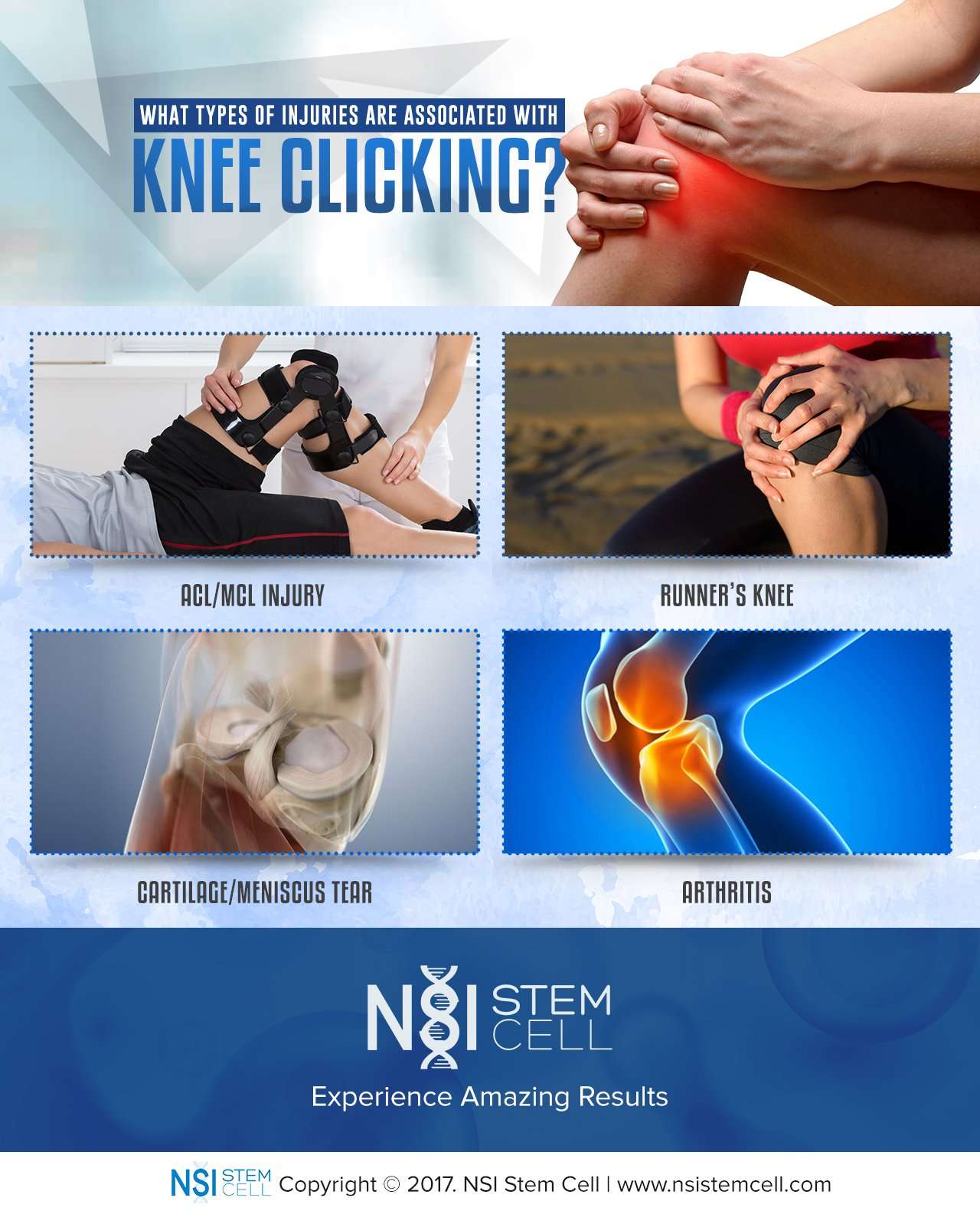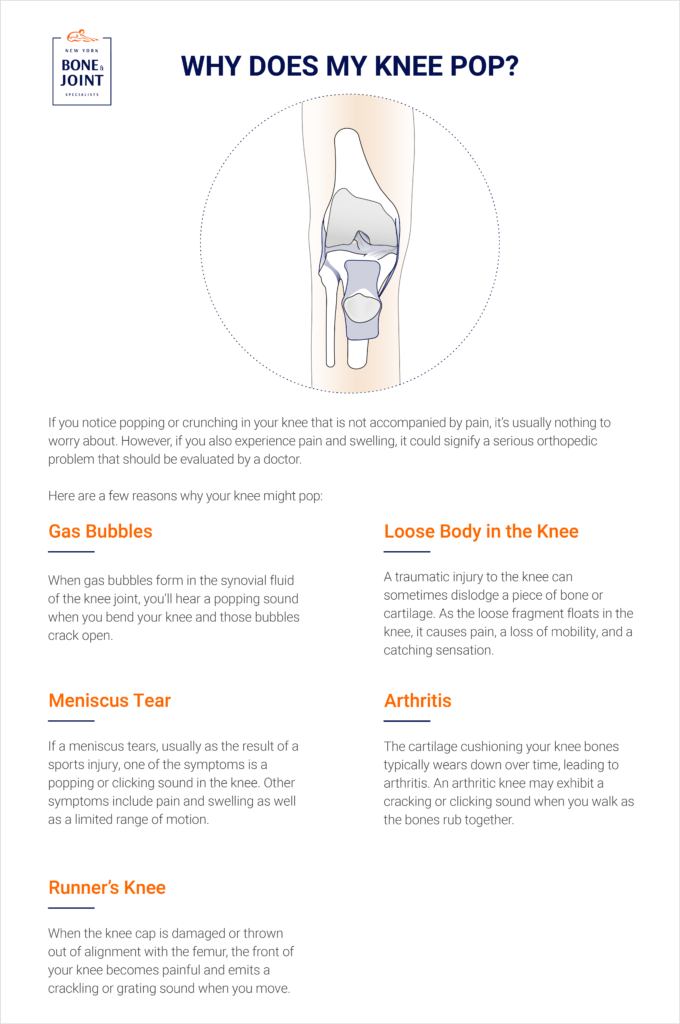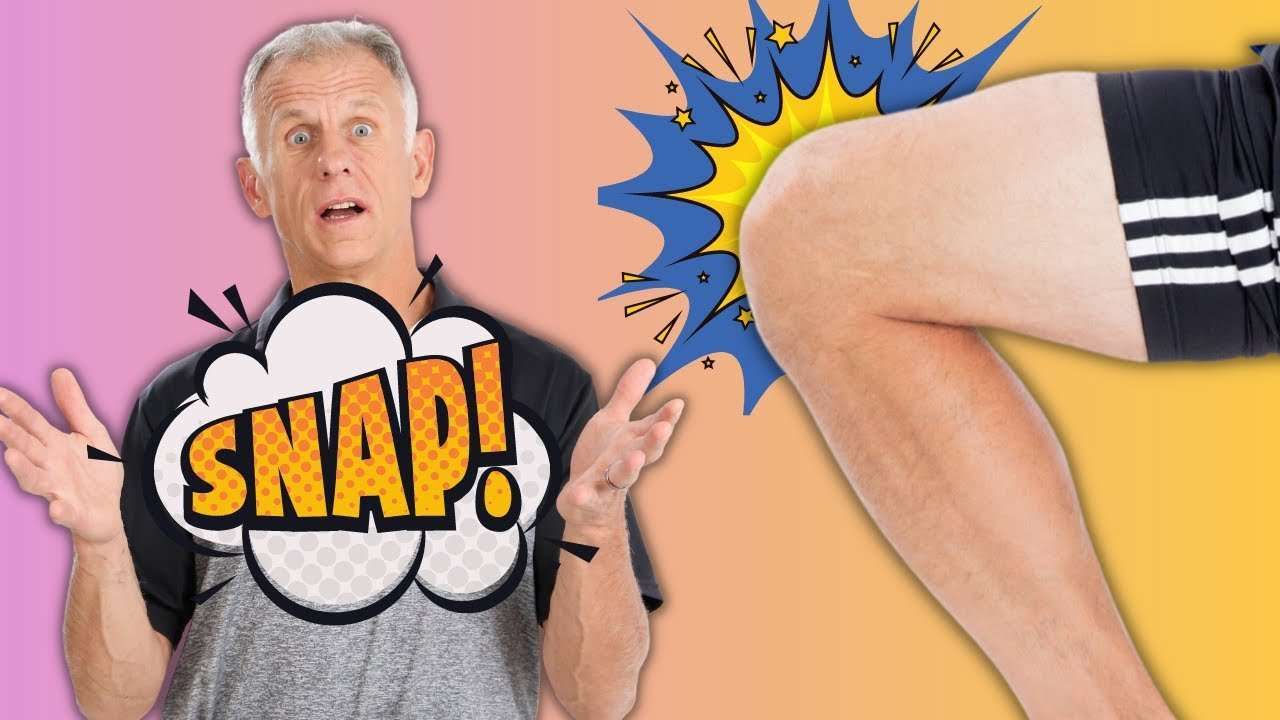Why Does My Knee Pop With Every Step
This type of popping symptom is often a sign of a meniscus tear or a loose piece of cartilage within the joint. 1 These are tissues inside the knee that help cushion and protect the joint. The torn meniscus or loose cartilage may catch in the knee as it moves back and forth. This causes a popping sensation.
Anatomy Of The Menisci
These c-shaped, strong, yet somewhat flexible structures of the knee are made of collagen and act as shock absorbers. They also help to stabilize the knee joint. They are located on the tibial plateau. There are two menisci: named medial and lateral based on where they are located.
- Medial menisci: More stable and fixed and therefore is more likely to become injured.
- Lateral menisci: More mobile and is therefore somewhat less likely to become injured.
Knee Popping By Activity
Knee Popping When Extending: Knee popping when you straighten your knee is usually due to gas bubbles , plica syndrome or patellofemoral pain syndrome.
Knee Popping and Pain When Bending: If you get knee popping and pain when bending your knee e.g. squatting down, it is most likely due to a problem with the knee cartilage such as a meniscus tear or chondromalacia patella.
Knee Popping When Extending And Bending: If you get knee pain and popping with both knee flexion and extension, it is likely that there is damage to the joint surface such as cartilage damage or knee arthritis. If there is no pain, it is likely to be gas bubbles popping.
Knee Popping With Twisting: Sudden knee pain and popping when you twist is usually doe to a knee ligament injury, most often an ACL injury and/or MCL tear. If the knee swells up or feels unstable after hearing a pop as you twisted, seek medical attention immediately.
Knee Popping When Walking: Almost all the possible causes of knee popping that we’ve looked at here can cause knee pain and popping when walking, be it arthritis, runners knee, cartilage tear or ligament injury. There will usually be other symptoms associated here that will lead to a clearer knee pain diagnosis.
Also Check: What Is The Best Knee Walker
Why Does My Knee Click
Posted on:
If you have ever heard your knees making noise when you step up, bend down, or stand up, it can be a little unnerving. What is causing it? Is there a problem with your knees?
Many of our joints can make noises at times and knees are no different. So why do knees click or pop when they bend? And when is it a concern?
There are several possibilities for the clicking or popping noises you may hear:
Air bubbles in the synovial fluid: Synovial fluid is found in all our joints. It helps the bones glide smoothly over one another. Air bubbles can form in this fluid. When you bend your knee, these tiny bubbles can escape and result in a popping noise. These escaping bubbles do not cause any pain and are not an indication of any problem.
Movement of ligaments or tendons: The ligaments and tendons around your knee connect bones and muscles together and give us the ability to move and bend. An unusual rotation or movement of your knee may cause a tight ligament or tendon to pop. Along with a popping sound, tight tendons or ligaments can cause some pain in the knee. Stretches or release exercises can help relieve the tension and treat the pain.
Dr. Paul Jacob is a leading hip and knee surgeon in Oklahoma City who pioneered robotic joint replacement surgery in an outpatient setting. Dr. Jacob has performed over 5000 robotic joint replacement procedures and actively participates in numerous research studies on robotic outcomes.
Treatment For Knee Pain

If youre suffering from persistent knee pain and instability, the physicians and physical therapists at New York Bone & Joint Specialists can get your knee healthy again. We are experts in diagnosing joint disorders and will plan a treatment regimen based on your individual needs. Contact us today for an appointment.
Recommended Reading: Dcf Knee Compression Sleeve
Damage To The Knee Joint
Sometimes, however, there is an underlying problem, for example, tissue damage or lesions. In this case, treatment may be necessary.
If there is pain as the knee snaps or catches, it can be because scar tissue, a meniscus tear, or a tendon is moving over a protruding bone within the knee joint.
Pain or swelling can be a sign of a more serious problem, such as patellofemoral pain syndrome , a tear in the cartilage or other soft tissue, or osteoarthritis .
These issues may need medical attention. Lets look at them now in more detail.
Tips For Healthy Knees
- Regular exercise can strengthen your legs and knees. Exercise with weights or resistance bands — or do bodyweight moves, like squats and lunges — at least twice a week. Walk up stairs or hills, or ride a stationary bicycle to build muscle to support your knees.
- Warm up before you exercise. An intense workout with cold muscles and joints can cause injury.
- Keep flexible. Before exercise, try dynamic stretches, in which you move a muscle through a full range of motion. After exercise, do static stretches, where you hold a stretch for 30 seconds. This helps prevent injury. Regularly stretch the muscles in the front and back of your thigh .
- If youâre already exercising, slowly work up to harder, longer workouts.
- Wear shoes that fit right and are in good condition.
- Stay at a healthy weight. Youâll reduce stress on your knees. Being overweight is a major risk factor in developing early arthritis of the knee.
âThe best thing is to keep the muscles around the knees strong,â McAllister says.
Show Sources
Don’t Miss: Roller Knee Walker
Treatments For Knee Popping And Snapping
Knees that experience painless popping and snapping are usually normal and do not need any treatment, says Dr. Gibson. Painful knee popping may respond to rest, ice, elevation, and avoidance of the activity causing the pain.
Depending on your specific condition, your healthcare provider may recommend one or more of the following treatments.
Reasons Not To Worry About Your Clicking Knees:
Many of our physiotherapists are dual trained as musculoskeletal sonographers. This means they use diagnostic ultrasound as part of their clinical assessment to look inside the body to assess the joint and surrounding soft tissue structures such as ligaments and tendons.
Diagnostic ultrasound is a dynamic imaging technique. Unlike static imaging techniques such as an X-ray or MRI, ultrasound can assess the structures whilst the patient can carry out a specific movement that reproduces the click. This makes it the perfect assessment to accurately identify the structures that are causing the clicking and the specific reason for your pain.
If you are worried about your clicking knees and would like to book an appointment or for more information please email or call 0207 482 3875.
You May Like: Best Knee Walker 2016
Some Concern: Persistent Popping With Swelling Pain Catching Or Grinding
When the knee popping sounds are accompanied by swelling and pain, or produce a catching sensation, or the knee gives way, I worry about a possible injury within the knee. A physician should examine the knee to help make a clear diagnosis.
In this case, there are several possible explanations for the popping. The noise and pain may be a mechanical symptom, which feels like something is caught in the knee as it moves back and forth. This kind of popping is often a sign that you have a meniscus tear, or that a small piece of loose cartilage is caught in the knee. You would most likely feel this kind of popping pain come and go. An exam, X-ray, and MRI will tell the definitive story.
Painful knee popping can also be caused by osteoarthritis, where the smooth cartilage has worn down and the bones cause friction when they rub against one another. This painful popping would be more persistent.
Another common problem that results in a popping or grinding sensation is roughness on the undersurface of the patella. This used to be called chondromalacia, and is often labeled as patellofemoral pain syndrome, or runners knee. Often you may feel the popping, grinding, or crunching more than you can hear it. To feel this, try squatting with your hand flat over the front of your knee.
For each of these types of knee sounds, if there is no tissue torn, anabolic injections of growth factors plus lubricants has been surprisingly and often dramatically effective.
Is There Any Treatment For It
Some will perceive fewer knee noises after losing some weight, or after starting an exercise regime.
In healthcare, we usually treat the noises when theres joint pain or an injury involved.
For example, if the noise is due to a ligament tear, we treat the tear. Once its managed, the crack or pop should disappear.
Also Check: Inversion Table After Hip Replacement
How Can I Naturally Lubricate My Knees
Foods high in healthy fats include salmon, trout, mackerel, avocados, olive oil, almonds, walnuts, and chia seeds. The omega-3 fatty acids in these foods will assist in joint lubrication. Water can assist in joint lubrication. Make sure you drink plenty of water each day to ensure that your joints are lubricated.
Can A Meniscus Tear Heal On Its Own

In the case of meniscus tears, some people think the injury will heal over time on its own. But the truth is that there are different types of meniscus tears and some tears wont heal without treatment. If your tear is on the outer one-third of the meniscus, it may heal on its own or be repaired surgically.
Also Check: Ginger Poultice For Knee Pain
Knee Braces And Other Supports
If your noisy knee is the result of osteoarthritis, your doctor might suggest using a knee brace or knee sleeve to support your knee joint, as research from 2014 suggests that it might help.
Orthotic inserts in your shoes might help too. It might not eliminate the noise, but a cane might help you get around a little easier, too.
Do Meniscus Tears Heal On Their Own
In the case of meniscus tears, some people think the injury will heal over time on its own. But the truth is that there are different types of meniscus tears and some tears wont heal without treatment. If your tear is on the outer one-third of the meniscus, it may heal on its own or be repaired surgically.
Also Check: Flying After Knee Replacement Surgery
Patellofemoral Pain Syndrome & Bicycling
Patellofemoral Pain Syndrome is a typical cycling overuse injury with PFPS commonly known as Bikers Knee and affects at least 25% of cyclists.
-
PFPS = Pain on the FRONT of your knee or under the kneecap.
-
Patellofemoral pain often presents as a gradual onset of knee pain behind or around the kneecap and is a common overuse injury experienced by hikers, cyclists, mountain bikers, runners, and triathletes.
The main causes of Bikers Knee is riding with a seat that is too low and improper BikeFit or prolonged riding in high gears.
Positions on a road bicycle, A. Seated, hands on brake hoods. B. Seated, hands in drops. C. Standing, hands on brake hoods . D. Standing, hands in drops – – –
Why Does My Knee Pop But Not Hurt
It could mean that you injured your anterior cruciate ligament, posterior cruciate ligament or medial collateral ligament or the meniscus or articular cartilage. A good rule of thumb is that if you experience clicking and catching of the knee, but feel no pain or swelling whatsoever, its likely normal.
Recommended Reading: Nano Knee Cost
What Are The Possible Causes Of Clicking And Catching Of The Knee
Cavitation. Sometimes the noise you hear is due to tiny air bubbles inside the joint fluid, which build up with changes in the joint pressure. When the bubbles burst, this is called cavitation. Cavitation is typically something that is not worrisome as long as it is unaccompanied by other symptoms .
Ligaments and tendons. Another possible cause of clicking and catching of the knee is when the ligaments and tendons catch as they go over a bony lump and pop as they snap back into place. Like cavitation, this is also not considered to be a serious problem if unaccompanied by other symptoms.
Soft tissue. Clicking may also be caused by the catching on soft tissue or scar tissue within the knee. Most of the time, these noises are natural and do not necessarily mean that youll develop other issues .
Meniscus tear. If you feel some pain as the clicking/popping occurs, it could be a sign of a meniscus tear, which means there is a small piece of loose cartilage caught in the knee. Treatment for a torn meniscus commonly includes rest, pain relievers and physical therapy. Less commonly, surgery may be required.
Osteoarthritis. If youre experiencing painful and persistent clicking/popping, it could indicate osteoarthritis, in which the smooth cartilage has worn down and the bones cause friction when they rub against one another.
When Should I Be Concerned Enough To See A Physician
If you experience the clicking and catching and its accompanied by swelling and/or severe and persistent pain its time to see your physician for an examination and clear diagnosis. Also, if theres a pop at the time of an injury and your knee begins to swell, it could very well be a sign that there has been damage. It could mean that you injured your anterior cruciate ligament, posterior cruciate ligament or medial collateral ligament or the meniscus or articular cartilage.
A good rule of thumb is that if you experience clicking and catching of the knee, but feel no pain or swelling whatsoever, its likely normal. However, if you have pain, instability and/or swelling, be sure to see your physician in order to avoid further damage to the joint. Of course, if youre worried even without pain or swelling, you should still consider seeing a knee specialist for your own peace-of-mind.
Don’t Miss: Inversion Table For Knee Pain
Less Common Causes Of Knee Pain
Less-common causes of significant knee pain include conditions and injuries. Injuries include:
- Dislocated kneecap: Causes are sharp blows to the knee or twisting. Severe pain in the front of the knee plus buckling, slipping, or catching during movement.
- Kneecap fracture: Causes are a direct blow or falling onto the knee. Pain, difficulty straightening the leg, bruising, and swelling can occur. Sometimes there’s visible deformity.
Conditions include:
- Gout: High uric acid levels form sharp crystals inside the joint. Affects the knee, hip, fingers, and especially the big toe. Pain can be severe.
- Plica syndrome: Irritation of the synovium . Pain is in the middle and front of the knee. Worsens with inactivity or squatting, running, or kneeling. The knee may pop when bent.
- Osgood-Schlatter disease: Strikes after growth spurts in kids between 9 and 14. Pain is in the front of the knee. It improves with rest and worsens with activities like running and jumping.
- Osteochondritis dissecans: In children, lack of blood supply weakens the bone and cartilage. The knee may separate from the underlying bone. Causes pain with activity.
- Knee joint infection: Causes significant pain, swelling, warmth, painful movements, and fever. It may result from a bacterial infection in the bloodstream.
- Bone tumor: Very rarely the source of knee pain. Symptoms include fever, unintentional weight loss, and pain that’s worse at night.
How Long Can You Walk On A Torn Meniscus

As this healing occurs, patients progress towards bearing weight, increasing their range of motion, and leaving the knee brace behind. How quickly this progress occurs varies by surgeon, but a typical range is 4-8 weeks. Patients are usually out of the brace and walking without crutches around 2-3 months.
Read Also: Where To Get Knee High Converse
Exercise : Calf Stretch
- Place your hands slightly wider than shoulder-width apart on a wall.
- Step back with the foot of the affected leg, far enough so that you feel a stretch in your calf. Make sure your toes are pointed toward the wall, and your foot is perfectly straight.
Avoid this common mistake: If you turn or angle your foot even slightly, you wont stretch the muscles and fascia youre supposed to.
- Straighten the affected leg .
- Bend the leg closest to the wall until you intensify the calf stretch to between 8 and 9 on your personal pain scale.
- Hold for between 2 and 2.5 minutes.
- Repeat on the other side.
Learn What Conditions Cause A Knee Pop And How To Treat Them
Hearing a pop in the knee can be alarming, especially if you notice swelling or pain directly following. Similarly, a pop in the knee with no swelling afterwards may cause you confusion and make you wonder if you need to be concerned at all. While this mysterious noise might be nothing to worry about, taking measures to treat the possible injury will hinder its progression.
The knee specialists at Rothman Orthopaedic Institute have diagnosed and treated plenty of knee pops during their time in the field of orthopaedics. We understand that the uncertainty of this symptom can cause patients stress. For this reason, we want to keep our patients as informed as possible by providing clear communication, expert advice, and the most advanced methods of treatment.
Recommended Reading: Inversion Table Benefits For Knees